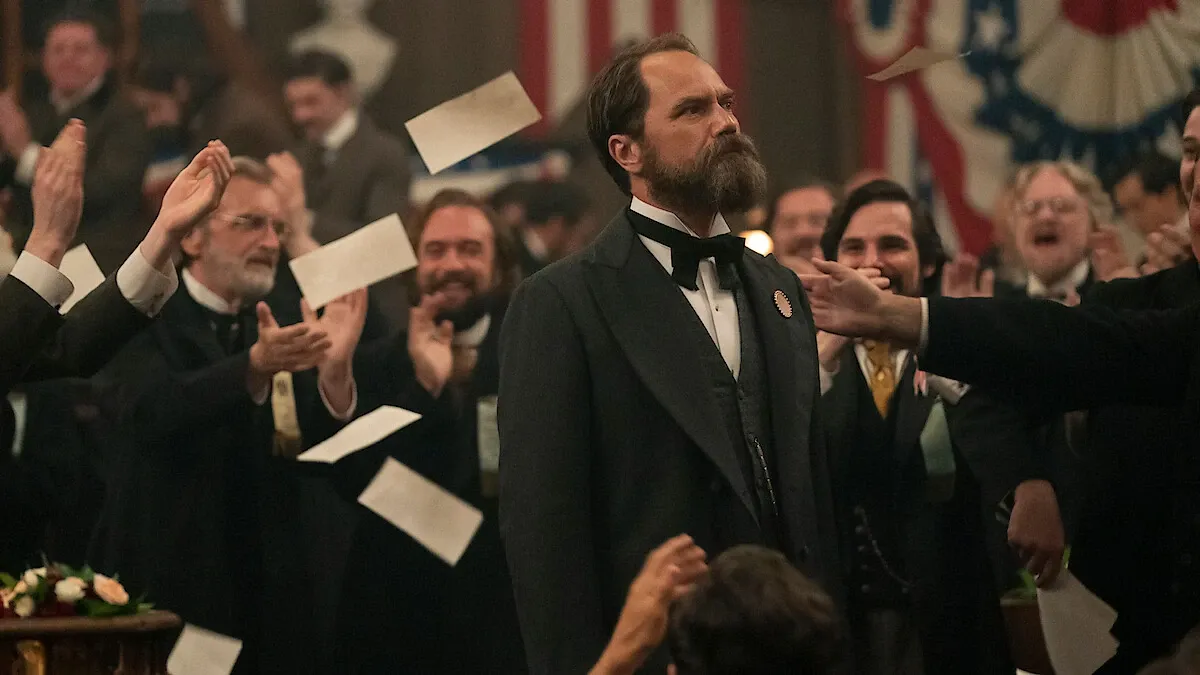Once upon a time at a wedding
A good comedy has to be about something. That really should be obvious, yet it always doesn’t feel that way. Most of them have a plot, but they lack a story or overarching theme that stays with you. That’s why classics like GROUNDHOG DAY stand strong: people remember them fondly because they speak to us on a deeper level.
Arriving into an abnormal world, where isolation is routine for most, PALM SPRINGS hits a timely nerve almost by accident. What isn’t an accident is how it proves itself timeless by poignantly riffing on millenial trauma, anxiety, and, ultimately, compassion in a brilliant comedy for the ages.
Nyles (Andy Samberg) is a prototypical man-child to the point that it’s painful to watch. We first see him smooching around a wedding he doesn’t want to be with a girlfriend he doesn’t particularly like. Then, out of the blue, he delivers an immaculate and touching speech that saves the troubled Sara (Cristin Milioti) from giving one herself. The two bond, get drunk and fool around – only to wake up the next day and realize everything is on repeat.

It’s a time-loop, again
“It’s one of those infinite time-loop scenarios,” Nyles casually explains. “You may have heard of them.” It’s as close to a reference as we get to GROUNDHOG DAY. Whatever the case, the duo remain stuck in the same insipid wedding for what looks like an eternity. They don’t age, so life, as much as they know it, is over.
After the initial panic, including some hilarious attempts at reversing the situation, Sara settles into the same ennui as Nyles. If nothing matters, they decide, at least they’re not alone. But is togetherness enough, and if it is, would that be scarier than spending eternity alone? It’s here the PALM SPRINGS reveals itself a darker, more melancholy, and touching film than expected.
As their endless wedding day repeats, Nyles and Sara start messing with the guests to see what they can get away with. But watch the backgrounds and how the scenes unfold. There’s a passive quality to everyone around them, almost like they’re working through a subroutine that’s not quite finished. Someone will always cheat on another, while others will consistently stumble to bed drunk no matter what. Even our leading duo, with hundreds of years of trial and error before them, spend a vast amount of it drinking or on drugs.
This might make PALM SPRINGS sound direr than it is – and LEAVING LAS VEGAS it’s not. But it’s a film that rewards multiple viewings, thanks to a smart script that consistently reinvents itself as if the universe was pulling improv. A game cast and a supporting group of extras make every frame a delight, as there’s always something going on. Particularly noteworthy is Meredith Hagner, playing Misty, Nyles’ girlfriend. Hagner is a riot in the superficial bimbo part, which slowly reveals itself more tragic as time goes on.

Alone together
PALM SPRINGS wouldn’t work without it’s leading duo, and both Samberg and Milioti pay off big time. Samberg is a big and animated actor whose expertise is being a living cartoon. By comparison, Milioti and J.K. Simmons play their parts more straight, though both get terrific comedic moments. But they communicate with their eyes and subtle facial ticks. Milioti especially is remarkable in conveying years of guilt, self-loathing, and fear with a single look. Putting them together centers the film: nobody wants to look backward, but they also don’t want to keep going forward.
Not that Samberg is bad, far from it. What starts off as a riff on his Jake Peralta character quickly grows into a more subtle depiction of insecurity run rampant. For the first time, the manchild routine has a point, and Samberg mines it for one of his best performances. Nyles is a jerk; there are no two ways about it. He’s selfish and callous, even manipulative and abusive. It’s unclear how long he’s been in the loop, but the insinuation is it could be hundreds of years.
There’s also a far darker undercurrent the film toys with but sadly leaves alone for the most part. “There’s no fun in being a harbinger of fear and death. I know, I’ve tried it,” Nyles declares. The implication is obvious: over time, anything goes. But even if there are no consequences, he has to live with the knowledge of what he’s done. As the revelations keep coming, PALM SPRINGS flirts with the same depressing realizations of past regrets that the haunting LA BELLE EPOQUE did last year.
PALM SPRINGS works so well because underneath the laughs it always has something to say. What do you do when you’re past the point of thirty where you can even say thirtysomething but have little to show for it? How do you prepare yourself for heartbreak and loss, knowing they are waiting down the line? One day we’ll all be orphans, and one day we won’t have someone to love. PALM SPRINGS understands that growing up isn’t a phase that happens instantly at a certain age, but a continuing process we deal with all through our lives. It takes the chance of using a goofball comedy to paint a vivid and moving portrait like this, and for that it deserves to be applauded.
And while not all of the answers are quite satisfying (the third act beelines for the end a tad too quick), PALM SPRINGS is emotionally so rewarding it ultimately doesn’t matter. It captures the disillusionment of a generation and communicates that hopelessness with the pop-culture vocabulary we’ve built for ourselves. There’s nothing as scary as time, it says, but also nothing as thrilling.













